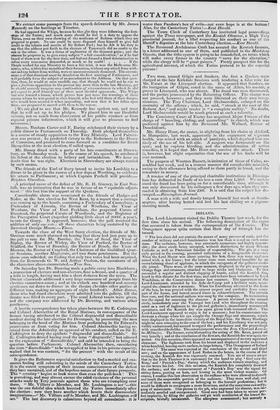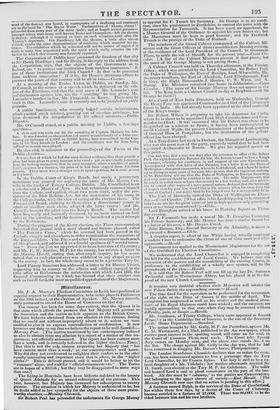IRELAND.
The Lord-Lieutenant visited the Dublin Theatre last week, for the first time since his arrival. The following description of the scene that occurred is taken from the correspondent of the Courier. The Orangemen appear quite certain that their day of triumph has re- turned.
" The box sheet did not contain the names of many persons of rank, and the number of military and civil functionaries was less than is usual on such occa- sions. The audience, however, was extremely numerous, and highly respect- able ; the dress circle being occupied, without distinction, by many Roman Catholic as well as Protestant families of respectability. The pit, at a very early period in the evening, presented indications of a disagreeable character. When the Lord Mayor was about entering his box, there was some applause mixed with a few hisses; but the latter were soon rendered inaudible by an overwhelming shout of applause, in which the occupants of the galleries cordi- ally joined. There were, at the same moment, displayed in the pit, numerous Orange flags and streamers, attached to large sticks and bludgeon.. To this succeeded a regular and distinct clapping of hands, called the Kentish fire, heard in this theatre for the first time, and said to have been introduced by Lord Winchilsea, at the Conservative dinner last summer. The appearance of the Lord-Lieutenant, attended by his Aide.de-Camp and a brilliant suite, iuter- rupted the clamour for a moment. When his Excellency advanced to the front of the box, he was greeted with the utmost respect and cordiality from every part of the house, and bowed several times in acknowledgment. The curtain then rose, and the national anthem was sung by the company. Its termination was the signal for renewing the clamour. A 'person stationed in the second circle, immediately over the Viceregal box (and who throughout the evening acted as a sort of fugleman to the pit and galleries), immediately connnenced operations, and the Kentish fire was again given with increased effect. The Lord-Lieutenant appeared to enjoy it for a moment ; but his countenance un- derwent a change when his eye caught the Orange flags and streamers, which were displayed in the immediate vicinity of the Royal box. Sir Henry Hardinge might be seen retreating to the rear of the box ; and his Excellency was not only visibly embarrassed, but seemed to regard the performance and tbe proceedings with considerable dislike. The entertainments were the Iron Chest and Love a- la-Militaire. The former, notwithstanding the acting of Mr. Kean, passed off very heavily ; and at the conclusion of the first act, the Kentish fire was again re- peated. On this occasion, there appeared an accompaniment of no very equivocal character. The fugleman took from his breast and displayed to the audience a white kerchief, bearing on its surface, in large letters, The Orangemen of Ireland for ever ! ' The same was repeated at the conclusion of the second and third acts; and on the appearance of Lord Roden in the boxes, in the course of the evening, the Kentish fire was vigorously renewed. You are of course aware that in the Irish Theatres it is customary for the band to play God save the King,' and Patrick's Day,' during which the audience remain standing, and
no one wears his hat. On this occasion, the Kentish fire completely drowned the anthem; and the commencement of Patrick's Day' was the signal for sitting down, putting on hats, and hissing in the most violent manner. Of course, I confine this last observation to the ruffians who were allowed to disturb and insult the respectable portion of the audience. They were well clad, and some of them were recognized as belonging to the learned professions; but it
would be difficult to congregate a more ferocious, and at the same time cowardly, gang of miscreants. One person in the pit, who expressed his dissent, was im- mediately assailed and overpowered. Good care had been taken to secure per- fect impunity, by filling the galleries and pit with auxiliaries of the lowest de- scription, brutally intoxicated. The afterpiece commenced; but scarcely a word of the first act was heard, in consequence of a deafening and continued cry to the band for "fhe Boyne Water.' Exclamations of ' Shame, shame ! ' proceeded from every part of the dress circle; and at length several persons— amongst whom were many well-known Tories and Orangemen—left the theatre in disgust ; although it is Unusual to leave on such occasions until after the Viceroy's departure. his Excellency left the theatre, a little after eleven o'clock, amidst the same demonstrations of cordiality which attended his en- trance. The exhibition which he witnessed will not be matter of regret if it tends to make him acquainted with the spirit whieh really actuates the vile faction by which this country was formerly oppressed."
The Corporation of Dublin have presented the freedom of that city to Sir Henry Hardinge ; and Sir Henry, in his reply to the address from the Corporation, says, that the objects of the Government as to Ireland, are " to protect our institutions from reckless innovation." Is one of those institutions the Irish Church ? Is that :o be protected from reckless innovation ? If it be, Sir Henry's strenuous efforts to preserve the peace of that country will be all in vain. —courier. At a meeting of the Trades Union in Dublin, on Sunday, Mr. O'Connell, in the course of a speech which he delivered on the sub- ject of the Elections, said that the real cause of Mr. Latouche's vote and declaration against him, was the " scuttling" he was giving Mr. Latouche's brother-in-law, Mr. Fitzgerald, in Kerry. There may be truth in this. Latouche's vote is certainly not to be justified on public grounds. A public functionary, who recently lodges! certain informations, which excited much interest, growing out of election privileges, has been dismissed for irregularities in his official accounts.—Dublin Dispatch.
Mr. O'Connell stated, at a public meeting in Dublin, a few days ago,•that-
A clear case was made out for the unseating of Captain Mathew for Ath- lone. It was founded on the accident (of course unintentional) of a letter con- taining an inelosure of 2,000/. or 3,000/. having been transmitted to the Cap- tain by his Tory friends in London : and the remittance was far from being suffirjr1 to remain unemployed.
He also said, in reference to the proceedings of the Tories at the Dublin election— He also said, in reference to the proceedings of the Tories at the Dublin election— It was a fact of which he had the most distinct evidence, that three pounds a piece had been given to every freeman who voted ; yet so wretchedly penurious were the bribing committee, that in sonic instances, when a tumbler of punch had been given to a freemen, the price of it had been stopped from his three pounds. There never was a stronger case to upset a petition, let it come as soon as it pleased.
In the Dublin Court of King's Bench, last week, a peremptory mandamus was granted for replacing the name of Mr. Marcus Cos- tello in the books of Trinity College, Dublin. Mr. Costello had been a scholar and a Master of Arts. He had voluntarily removed himself from the College, and applied, about two years since, under the pro- visions of the Irish Reform Act, for the restoration of his name to the College-books, with the view of voting at the election there. The Provost and Board, claiming to themselves a discretionary power to admit or disallow such claim, adopted the latter course : and Mr.
Costello brought the affair into the King's Bench. The matter had been frequently and learnedly discussed by eminent counsel on both sides of the question ; and the decision is considered a great triumph by the Reformers.
During the progress of the Kerry election, -the 7'isnes correspondent furnished that journal with a most absurd and furious placard, called " The Patriot's Curse," which he asserted had been posted in the Catholic chapels and elsewhere, in order to intimidate the supporters of the Tory candidate. The Times and other Tory newspapers made much of this placard, and adduced it as a fearful specimen of " mental terror. ism." From the first we suspected it to be an invention of the enemy ; .and Mr. E. W. Mullins, Iii. P. for the county, bas written a letter to the Morning Herald, stating that, after ample inquiry, he has ascer- tained that no such placard ever was exhibited in any chapel or place in the county. In fact, the whole story seems to be a genuine Tory lie.
Lord Fitzroy Somerset has addressed a letter to Sir Hussey Vivian, requesting him to convey to the officers and soldiers cupeed in the tithe affair at Rathcormac the satisfaction with which Lord' Hill, the General Commanding in Chief, has learned that their conduct was such as to c..11 forth the most unqualified approbation of the Magistrates.
























 Previous page
Previous page